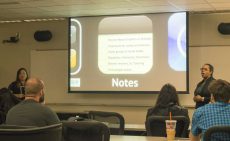By Jason Patrick/reporter

NE students learned study skills April 27 from academic advisors Amy Reece and Alicia Thomas to prepare for finals.
“I really stress to you to find out what study habits and environments work best for you,” Reece said.
Students received handouts containing a checklist, a mock to-do list and a list of helpful apps. During the presentation, Reece and Thomas provided a handout with visuals of different scenarios highlighting good and bad study behaviors.
An accompanying video showed a student who studied better while listening to classical music. By listening to music, the student could control the environment, making studying more beneficial.
Time management is a component of good study habits. Good time management skills include making sacrifices, making to-do lists and dedicating the proper amount of time to studying.
“It is recommended that you study three hours outside of class time for each credit hour you are taking,” Thomas said.
The environment where students choose to study is also important.
“Do not study where you sleep,” Reece said.
Studying while in bed promotes sleeping instead of studying, she said.
Avoiding bad distractions allows students to engage in beneficial studying. Distractions include things like using social media, texting and playing video games. In contrast, there are good distractions that improve concentration. These include taking a walk and exercising, switching subjects and doing small chores.
“Small chores can be very therapeutic, especially if you’re studying and you notice that your house is a mess,” Thomas said. “It can be very therapeutic to just clean and straighten up for a little bit and then get back to studying because that’s an activity outside of studying that can help you get your juices flowing.”
Using study methods such as repetition, flash cards and study groups provide students with reinforcement while retaining information.
“Be very selective in picking your study group,” Thomas said. “You want to find the yin to your yang.”
A study group that does not complement student needs can also be considered a bad distraction, she said.



































